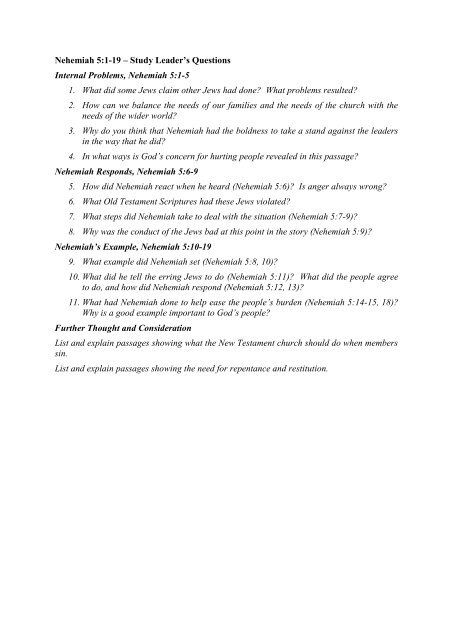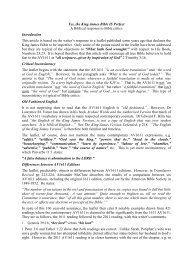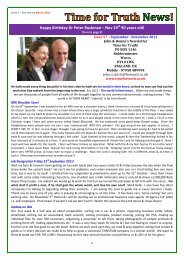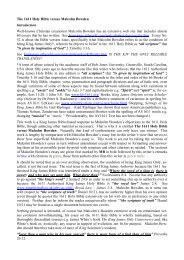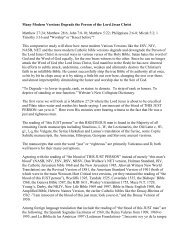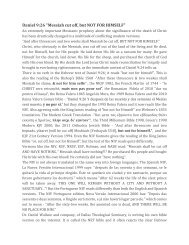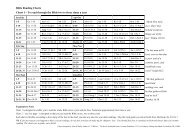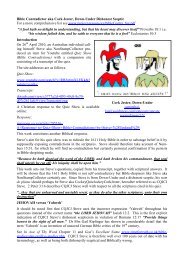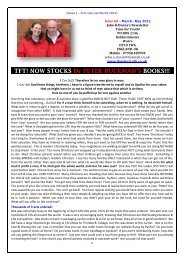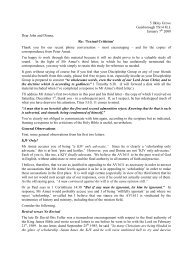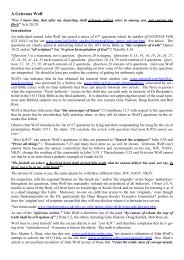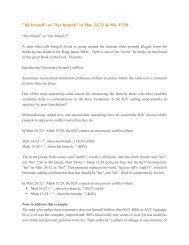Nehemiah 5:1-19 â Study Leader's Questions ... - Time for Truth
Nehemiah 5:1-19 â Study Leader's Questions ... - Time for Truth
Nehemiah 5:1-19 â Study Leader's Questions ... - Time for Truth
You also want an ePaper? Increase the reach of your titles
YUMPU automatically turns print PDFs into web optimized ePapers that Google loves.
<strong>Nehemiah</strong> 5:1-<strong>19</strong> – <strong>Study</strong> Leader’s <strong>Questions</strong><br />
Internal Problems, <strong>Nehemiah</strong> 5:1-5<br />
1. What did some Jews claim other Jews had done? What problems resulted?<br />
2. How can we balance the needs of our families and the needs of the church with the<br />
needs of the wider world?<br />
3. Why do you think that <strong>Nehemiah</strong> had the boldness to take a stand against the leaders<br />
in the way that he did?<br />
4. In what ways is God’s concern <strong>for</strong> hurting people revealed in this passage?<br />
<strong>Nehemiah</strong> Responds, <strong>Nehemiah</strong> 5:6-9<br />
5. How did <strong>Nehemiah</strong> react when he heard (<strong>Nehemiah</strong> 5:6)? Is anger always wrong?<br />
6. What Old Testament Scriptures had these Jews violated?<br />
7. What steps did <strong>Nehemiah</strong> take to deal with the situation (<strong>Nehemiah</strong> 5:7-9)?<br />
8. Why was the conduct of the Jews bad at this point in the story (<strong>Nehemiah</strong> 5:9)?<br />
<strong>Nehemiah</strong>’s Example, <strong>Nehemiah</strong> 5:10-<strong>19</strong><br />
9. What example did <strong>Nehemiah</strong> set (<strong>Nehemiah</strong> 5:8, 10)?<br />
10. What did he tell the erring Jews to do (<strong>Nehemiah</strong> 5:11)? What did the people agree<br />
to do, and how did <strong>Nehemiah</strong> respond (<strong>Nehemiah</strong> 5:12, 13)?<br />
11. What had <strong>Nehemiah</strong> done to help ease the people’s burden (<strong>Nehemiah</strong> 5:14-15, 18)?<br />
Why is a good example important to God’s people?<br />
Further Thought and Consideration<br />
List and explain passages showing what the New Testament church should do when members<br />
sin.<br />
List and explain passages showing the need <strong>for</strong> repentance and restitution.
2<br />
<strong>Nehemiah</strong> 5:1-<strong>19</strong> – Answers to <strong>Questions</strong><br />
See Dr Ruckman’s commentary The Books of Ezra, <strong>Nehemiah</strong>, Esther pp 237-243 and the<br />
Ruckman Reference Bible pp 700-701 <strong>for</strong> detailed comments.<br />
Internal Problems, <strong>Nehemiah</strong> 1-5<br />
1. What did some Jews claim other Jews had done? What problems resulted?<br />
They “the nobles, and the rulers” <strong>Nehemiah</strong> 5:7 in particular, had acquired lands and<br />
vineyards from their Jewish brethren as security <strong>for</strong> loans, <strong>for</strong> which usury was being<br />
charged illegally and also purchased their sons and daughters as bond servants, not<br />
hired servants. The Jews affected were, understandably, grieving over their losses<br />
and despairing of any relief from their plight i.e. “neither is it in our power to redeem<br />
them; <strong>for</strong> other men have our lands and vineyards” <strong>Nehemiah</strong> 5:5. It appeared that<br />
no end was in sight.<br />
Their despair typified that of Israel in the End <strong>Time</strong>s.<br />
“Then he said unto me, Son of man, these bones are the whole house of Israel: behold,<br />
they say, Our bones are dried, and our hope is lost: we are cut off <strong>for</strong> our<br />
parts” Ezekiel 37:11.<br />
The encouragement <strong>for</strong> the Old Testament saint and indeed <strong>for</strong> the New Testament<br />
saint is that the end will come and it will be good, according to God’s purposes.<br />
“For I know the thoughts that I think toward you, saith the LORD, thoughts of<br />
peace, and not of evil, to give you an expected end” Jeremiah 29:11.<br />
2. How can we balance the needs of our families and the needs of the church with the<br />
needs of the wider world?<br />
Paul and the Lord Himself give practical guidelines, with respect to priority, prosperity,<br />
purpose and poverty.<br />
Priority – the family is first<br />
“But if any provide not <strong>for</strong> his own, and specially <strong>for</strong> those of his own house, he<br />
hath denied the faith, and is worse than an infidel” 1 Timothy 5:8.<br />
Prosperity – the gift is proportionate<br />
“Now concerning the collection <strong>for</strong> the saints, as I have given order to the churches<br />
of Galatia, even so do ye. Upon the first day of the week let every one of you lay by<br />
him in store, as God hath prospered him, that there be no gatherings when I come”<br />
1 Corinthians 16:1-2.<br />
“For if there be first a willing mind, it is accepted according to that a man hath,<br />
and not according to that he hath not. For I mean not that other men be eased, and<br />
ye burdened:” 2 Corinthians 8:12-13.<br />
Purpose – the gift is appropriate<br />
“But this I say, He which soweth sparingly shall reap also sparingly; and he which<br />
soweth bountifully shall reap also bountifully. Every man according as he purposeth<br />
in his heart, so let him give; not grudgingly, or of necessity: <strong>for</strong> God loveth a<br />
cheerful giver” 2 Corinthians 9:6-7.<br />
Poverty – the gift is considerate
3<br />
“For ye have the poor with you always, and whensoever ye will ye may do them<br />
good: but me ye have not always” Mark 14:7. The Lord would have had in mind<br />
Deuteronomy 15:11 “For the poor shall never cease out of the land: there<strong>for</strong>e I<br />
command thee, saying, Thou shalt open thine hand wide unto thy brother, to thy<br />
poor, and to thy needy, in thy land.”<br />
“Only they would that we should remember the poor; the same which I also was<br />
<strong>for</strong>ward to do” Galatians 2:10.<br />
Practically speaking, the above scriptures may have wide applicability. This is one<br />
reason <strong>for</strong> giving to charitable organisations such as the Royal British Legion and St<br />
Dunstan’s. Gifts made by post can have tracts enclosed.<br />
Though applying to the local church in particular, note also the admonition from<br />
James 2:15-17.<br />
“If a brother or sister be naked, and destitute of daily food, And one of you say unto<br />
them, Depart in peace, be ye warmed and filled; notwithstanding ye give them not<br />
those things which are needful to the body; what doth it profit? Even so faith, if it<br />
hath not works, is dead, being alone.”<br />
3. Why do you think that <strong>Nehemiah</strong> had the boldness to take a stand against the leaders<br />
in the way that he did?<br />
<strong>Nehemiah</strong> was not guilty of the wrong-doing himself. See <strong>Nehemiah</strong> 5:7- 9.<br />
“Then I consulted with myself, and I rebuked the nobles, and the rulers, and said<br />
unto them, Ye exact usury, every one of his brother. And I set a great assembly<br />
against them. And I said unto them, We after our ability have redeemed our brethren<br />
the Jews, which were sold unto the heathen; and will ye even sell your brethren?<br />
or shall they be sold unto us? Then held they their peace, and found nothing<br />
to answer. Also I said, It is not good that ye do: ought ye not to walk in the fear of<br />
our God because of the reproach of the heathen our enemies?”<br />
<strong>Nehemiah</strong> checked out his own life and actions and then he uses the term “Ye,” not<br />
“We” as found in <strong>Nehemiah</strong> 5:12. “The nobles, and the rulers” <strong>Nehemiah</strong> 5:7 appear<br />
to have been exacting usury <strong>for</strong> “borrowed money <strong>for</strong> the king’s tribute” <strong>Nehemiah</strong><br />
5:4, which was <strong>for</strong>bidden under the Law of Moses, Exodus 22:25. See Question<br />
6.<br />
“Then said they, We will restore them, and will require nothing of them; so will we<br />
do as thou sayest. Then I called the priests, and took an oath of them, that they<br />
should do according to this promise.”<br />
See remarks under Question 9 on “the hundredth part of the money, and of the corn,<br />
the wine, and the oil, that ye exact of them” <strong>Nehemiah</strong> 5:11, which appears to have<br />
been a legitimate exaction because <strong>Nehemiah</strong> did no wrong but he includes himself in<br />
the exaction of “money and corn” when he states “I pray you, let us leave off this<br />
usury” <strong>Nehemiah</strong> 5:10. “The hundredth part” may have precedence with respect to<br />
“a tenth part of the tithe” Numbers 18:26. See also Leviticus 27:30, 32, Numbers<br />
18:24 with respect to tithing and Genesis 14:20 and Hebrews 7:2, 4 with respect to the<br />
tithe as a tenth. The lesson would be that privilege is very likely to be abused. See<br />
Numbers 16:9-11, 22:18 and Jude 11 “Woe unto them! <strong>for</strong> they have gone in the<br />
way of Cain, and ran greedily after the error of Balaam <strong>for</strong> reward, and perished in<br />
the gainsaying of Core” with respect to real problem, which is greed. Note Paul’s<br />
warnings in Ephesians 4:<strong>19</strong> against “uncleanness with greediness” and in 1 Timothy
4<br />
3:3, 8 against being “greedy of filthy lucre.” As Solomon states in Proverbs 28:20,<br />
with respect to both <strong>Nehemiah</strong> and “the nobles and the rulers” <strong>Nehemiah</strong> 5:7, “A<br />
faithful man shall abound with blessings: but he that maketh haste to be rich shall<br />
not be innocent.”<br />
Further concerning <strong>Nehemiah</strong> and his innocence of wrong-doing, no-one answered<br />
him back after the manner of Romans 2:1.<br />
“There<strong>for</strong>e thou art inexcusable, O man, whosoever thou art that judgest: <strong>for</strong><br />
wherein thou judgest another, thou condemnest thyself; <strong>for</strong> thou that judgest doest<br />
the same things.”<br />
4. In what ways is God’s concern <strong>for</strong> hurting people revealed in this passage?<br />
God heard, recorded and caused to be reported “a great cry of the people and of their<br />
wives” <strong>Nehemiah</strong> 5:1 to His servant <strong>Nehemiah</strong>, who immediately responded and took<br />
particular steps to bring relief to the victims, <strong>Nehemiah</strong> 5:6-11.<br />
The passage has a parallel in Genesis 18:20-21.<br />
“And the LORD said, Because the cry of Sodom and Gomorrah is great, and because<br />
their sin is very grievous; I will go down now, and see whether they have<br />
done altogether according to the cry of it, which is come unto me; and if not, I will<br />
know.”<br />
<strong>Nehemiah</strong> 5:1-5 has End <strong>Time</strong>s implications.<br />
“Behold, the hire of the labourers who have reaped down your fields, which is of<br />
you kept back by fraud, crieth: and the cries of them which have reaped are entered<br />
into the ears of the Lord of sabaoth” James 5:4.<br />
For the Christian, again Philippians 4:6-7 applies, which should be memorized. That<br />
is basic. See <strong>Nehemiah</strong> 4 Part 2.<br />
“Be careful <strong>for</strong> nothing; but in every thing by prayer and supplication with thanksgiving<br />
let your requests be made known unto God. And the peace of God, which<br />
passeth all understanding, shall keep your hearts and minds through Christ Jesus.”<br />
<strong>Nehemiah</strong> Responds, <strong>Nehemiah</strong> 5:6-9<br />
5. How did <strong>Nehemiah</strong> react when he heard (<strong>Nehemiah</strong> 5:6)? Is anger always wrong?<br />
With anger as Paul did in 2 Corinthians 11:29.<br />
“Who is weak, and I am not weak? who is offended, and I burn not?”<br />
Anger is not always wrong, either <strong>for</strong> God, the Lord Jesus Christ or the Christian.<br />
“God judgeth the righteous, and God is angry with the wicked every day” Psalm<br />
7:11.<br />
“And when he had looked round about on them with anger, being grieved <strong>for</strong> the<br />
hardness of their hearts, he saith unto the man, Stretch <strong>for</strong>th thine hand. And he<br />
stretched it out: and his hand was restored whole as the other” Mark 3:5.<br />
“Be ye angry, and sin not: let not the sun go down upon your wrath:” Ephesians<br />
4:26.<br />
6. What Old Testament Scriptures had these Jews violated?
5<br />
The main scriptures were those relating to imposition of bond service and illegal usury.<br />
“If thou lend money to any of my people that is poor by thee, thou shalt not be to<br />
him as an usurer, neither shalt thou lay upon him usury” Exodus 22:25. See <strong>Nehemiah</strong><br />
5:3, 4, 7.<br />
“And if thy brother that dwelleth by thee be waxen poor, and be sold unto thee;<br />
thou shalt not compel him to serve as a bondservant: But as an hired servant, and<br />
as a sojourner, he shall be with thee, and shall serve thee unto the year of jubile:”<br />
Leviticus 25:39-40. See <strong>Nehemiah</strong> 5:5, 8.<br />
As a principle of how the Jews were supposed to care <strong>for</strong> each other during “the<br />
dearth” <strong>Nehemiah</strong> 5:3, see Deuteronomy 15:7-8, which clearly had also been violated.<br />
“If there be among you a poor man of one of thy brethren within any of thy gates in<br />
thy land which the LORD thy God giveth thee, thou shalt not harden thine heart,<br />
nor shut thine hand from thy poor brother: But thou shalt open thine hand wide<br />
unto him, and shalt surely lend him sufficient <strong>for</strong> his need, in that which he<br />
wanteth.”<br />
The evil of bond service imposed by some of the Jews’ brethren i.e. “The nobles, and<br />
the rulers” <strong>Nehemiah</strong> 5:7, see Question 3, was made worse by Jews selling their<br />
brethren as bond servants to the heathen round about, in extreme violation of Leviticus<br />
25:39-40, as <strong>Nehemiah</strong> 5:8 shows. See Question 3.<br />
“And I said unto them, We after our ability have redeemed our brethren the Jews,<br />
which were sold unto the heathen; and will ye even sell your brethren? or shall they<br />
be sold unto us?”<br />
7. What steps did <strong>Nehemiah</strong> take to deal with the situation (<strong>Nehemiah</strong> 5:7-9)?<br />
<strong>Nehemiah</strong>’s steps consisted of:<br />
<br />
<br />
public rebuke of offenders, <strong>Nehemiah</strong> 5:7-8 i.e. mainly “the nobles, and the<br />
rulers” <strong>Nehemiah</strong> 5:7, some of whom, it should further be noted “put not<br />
their necks to the work of their Lord” <strong>Nehemiah</strong> 3:5. See <strong>Questions</strong> 3, 6<br />
about “the nobles, and the rulers.”<br />
personal renunciation of privileges (i.e. setting the example even with respect<br />
to legitimate usury, possibly “the hundredth part”), <strong>Nehemiah</strong> 5:10<br />
pleas <strong>for</strong> restoration of lands, cultivation and houses, <strong>Nehemiah</strong> 5:11<br />
<br />
promises <strong>for</strong> obedience exacted by means of an oath, <strong>Nehemiah</strong> 5:12, 13. See<br />
also James 1:22, 23.<br />
<strong>Nehemiah</strong> 5:7-13 is an illustration of Psalm 1<strong>19</strong>:126 in action.<br />
“It is time <strong>for</strong> thee, LORD, to work: <strong>for</strong> they have made void thy law.”<br />
That is a good prayer <strong>for</strong> today.<br />
8. Why was the conduct of the Jews bad at this point in the story (<strong>Nehemiah</strong> 5:9)?<br />
It was a bad testimony to the heathen round about. Note Paul’s exhortation in 1 Thessalonians<br />
4:11-12.
6<br />
“And that ye study to be quiet, and to do your own business, and to work with your<br />
own hands, as we commanded you; That ye may walk honestly toward them that are<br />
without, and that ye may have lack of nothing.”<br />
1 Timothy 5:14 explains the reason why believers should “may walk honestly toward<br />
them that are without” even though in a different context.<br />
“I will there<strong>for</strong>e that the younger women marry, bear children, guide the house,<br />
give none occasion to the adversary to speak reproachfully.”<br />
The over-arching aim is to “Neither give place to the devil.” Ephesians 4:27.<br />
<strong>Nehemiah</strong>’s Example, <strong>Nehemiah</strong> 5:10-<strong>19</strong><br />
9. What example did <strong>Nehemiah</strong> set (<strong>Nehemiah</strong> 5:8, 10)?<br />
See Question 7.<br />
<strong>Nehemiah</strong> set a practical, caring example.<br />
“And I said unto them, We after our ability have redeemed our brethren the Jews,<br />
which were sold unto the heathen;...” <strong>Nehemiah</strong> 5:8.<br />
Note Paul’s equivalent exhortation in 1 Corinthians 12:25.<br />
“That there should be no schism in the body; but that the members should have the<br />
same care one <strong>for</strong> another.”<br />
<strong>Nehemiah</strong> set a self-denying example.<br />
“I likewise, and my brethren, and my servants, might exact of them money and<br />
corn: I pray you, let us leave off this usury” <strong>Nehemiah</strong> 5:10.<br />
<strong>Nehemiah</strong> 5:10, 18 indicate that some exaction of money and consumable goods by<br />
the rulers was legitimate. This exaction was most likely “the hundredth part of the<br />
money, and of the corn, the wine, and the oil, that ye exact of them” <strong>Nehemiah</strong> 5:11.<br />
See Question 3. <strong>Nehemiah</strong> insisted that all such exactions, though legitimate, be cancelled<br />
and en<strong>for</strong>ced the cancellation on himself first of all.<br />
Note Paul’s equivalent testimony in 1 Corinthians 9:7, 14-15.<br />
“Who goeth a warfare any time at his own charges? who planteth a vineyard, and<br />
eateth not of the fruit thereof? or who feedeth a flock, and eateth not of the milk of<br />
the flock?...Even so hath the Lord ordained that they which preach the gospel<br />
should live of the gospel. But I have used none of these things: neither have I written<br />
these things, that it should be so done unto me: <strong>for</strong> it were better <strong>for</strong> me to die,<br />
than that any man should make my glorying void...What is my reward then? Verily<br />
that, when I preach the gospel, I may make the gospel of Christ without charge,<br />
that I abuse not my power in the gospel.”<br />
Paul was willing to “gladly spend and be spent” <strong>for</strong> the sake of the gospel, 2 Corinthians<br />
12:15. So should any of Paul’s followers, 1 Corinthians 4:16, 11:1, not imitators*<br />
as in the <strong>19</strong>84 NIV, 2005 TNIV, 2011 NIV, NKJV.<br />
*The greatest imitator of the Lord Jesus Christ is the Devil, “<strong>for</strong> Satan himself is<br />
trans<strong>for</strong>med into an angel of light” 2 Corinthians 11:14, in imitation of the Lord Jesus<br />
Christ Who is “the light of the world” John 8:12. The Devil does not follow God,<br />
the Lord Jesus Christ or Paul. See the Ruckman Reference Bible p 1521.
7<br />
Note Paul’s testimony in 2 Thessalonians 3:7-10 with respect to his willingness to<br />
“gladly spend and be spent” <strong>for</strong> the sake of the gospel.<br />
“For yourselves know how ye ought to follow us: <strong>for</strong> we behaved not ourselves disorderly<br />
among you; Neither did we eat any man’s bread <strong>for</strong> nought; but wrought<br />
with labour and travail night and day, that we might not be chargeable to any of<br />
you: Not because we have not power, but to make ourselves an ensample unto you<br />
to follow us. For even when we were with you, this we commanded you, that if any<br />
would not work, neither should he eat.”<br />
See Question 7 with respect to nobles that “put not their necks to the work of their<br />
Lord” <strong>Nehemiah</strong> 3:5.<br />
Application of “the sword of the Spirit” Ephesians 6:17 with respect to 2 Thessalonians<br />
3:10 would encourage a torrent of reverse immigration from the UK, as a devotional,<br />
practical outworking of Jeremiah 50:16.<br />
“Cut off the sower from Babylon, and him that handleth the sickle in the time of<br />
harvest: <strong>for</strong> fear of the oppressing sword they shall turn every one to his people,<br />
and they shall flee every one to his own land.”<br />
Note however Paul’s exhortation to those who have received the Gospel ministry.<br />
“Let him that is taught in the word communicate unto him that teacheth in all good<br />
things” Galatians 6:6.<br />
<strong>Nehemiah</strong> set a God-fearing example.<br />
“But the <strong>for</strong>mer governors that had been be<strong>for</strong>e me were chargeable unto the people,<br />
and had taken of them bread and wine, beside <strong>for</strong>ty shekels of silver; yea, even<br />
their servants bare rule over the people: but so did not I, because of the fear of<br />
God.”<br />
“The fear of God” is a good, indeed excellent basis <strong>for</strong> doing right and not doing<br />
wrong, as Paul exhorts twice.<br />
“Having there<strong>for</strong>e these promises, dearly beloved, let us cleanse ourselves from all<br />
filthiness of the flesh and spirit, perfecting holiness in the fear of God” 2 Corinthians<br />
7:1.<br />
“Submitting yourselves one to another in the fear of God” Ephesians 5:21.<br />
10. What did he tell the erring Jews to do (<strong>Nehemiah</strong> 5:11)? What did the people agree<br />
to do, and how did <strong>Nehemiah</strong> respond (<strong>Nehemiah</strong> 5:12, 13)?<br />
<strong>Nehemiah</strong> urged “the nobles, and the rulers” <strong>Nehemiah</strong> 5:7 to make full restitution<br />
of what they had exacted from their brethren including “the hundredth part” that<br />
they appear to have been entitled to.<br />
The offenders promised to obey <strong>Nehemiah</strong>’s urging and <strong>Nehemiah</strong> confirmed their<br />
pledge with an official oath be<strong>for</strong>e the priests, see Question 7 and effectively pronounced<br />
a curse <strong>for</strong> disobedience.<br />
Note Hebrews 6:16, the essence of which would have applied in <strong>Nehemiah</strong>’s time.<br />
“For men verily swear by the greater: and an oath <strong>for</strong> confirmation is to them an<br />
end of all strife.”<br />
Imposition of a curse <strong>for</strong> disobedience was embedded in the Law.
8<br />
“Cursed be he that confirmeth not all the words of this law to do them. And all the<br />
people shall say, Amen” Deuteronomy 27:26.<br />
In principle, the same applies now. See Proverbs 13:13, which has never been rescinded.<br />
(Note the 13s in these references.) Proverbs 13:13 should be memorized.<br />
“Whoso despiseth the word shall be destroyed: but he that feareth the commandment<br />
shall be rewarded.”<br />
See the New Testament admonition in 1 Thessalonians 4:2, 7-8.<br />
“For ye know what commandments we gave you by the Lord Jesus...For God hath<br />
not called us unto uncleanness, but unto holiness. He there<strong>for</strong>e that despiseth,<br />
despiseth not man, but God, who hath also given unto us his holy Spirit.”<br />
11. What had <strong>Nehemiah</strong> done to help ease the people’s burden (<strong>Nehemiah</strong> 5:14-15, 18)?<br />
Why is a good example important to God’s people?<br />
He had refrained from the governor’s personal food and drink allowance and that <strong>for</strong><br />
his staff and guests and from his personal expense account.<br />
See Question 9 with respect to <strong>Nehemiah</strong>’s example.<br />
Examples will be followed, including wrong examples, as Solomon warns in Proverbs<br />
29:12.<br />
“If a ruler hearken to lies, all his servants are wicked.”<br />
Right examples are meant to be set so that they can be followed <strong>for</strong> that which, like<br />
“godliness is profitable unto all things” 1 Timothy 4:8, <strong>for</strong> that which, like “good<br />
works...are good and profitable unto men” Titus 3:8 and the avoidance of all “that is<br />
unprofitable <strong>for</strong> you” Hebrews 13:17, as Paul exhorts in Hebrews 13:7.<br />
“Remember them which have the rule over you, who have spoken unto you the<br />
word of God: whose faith follow, considering the end of their conversation.”<br />
Further Thought and Consideration<br />
List and explain passages showing what the New Testament church should do when members<br />
sin.<br />
The main passages are Matthew 18:15-17 and 1 Corinthians 5:4-5. The over-arching lesson<br />
is that sin should be confronted, not condoned or allowed to fester. See Romans 6:11-18 and<br />
1 Corinthians 6:18 in particular with respect to the sin of 1 Corinthians 5:1-5.<br />
“Flee <strong>for</strong>nication. Every sin that a man doeth is without the body; but he that committeth<br />
<strong>for</strong>nication sinneth against his own body.”<br />
Matthew 18:15-17<br />
See the Ruckman Reference Bible p 1270 and Dr Ruckman’s commentary The Book of Matthew<br />
pp 348-350.<br />
“Moreover if thy brother shall trespass against thee, go and tell him his fault between thee<br />
and him alone: if he shall hear thee, thou hast gained thy brother. But if he will not hear<br />
thee, then take with thee one or two more, that in the mouth of two or three witnesses every<br />
word may be established. And if he shall neglect to hear them, tell it unto the church: but<br />
if he neglect to hear the church, let him be unto thee as an heathen man and a publican.”<br />
Matthew 18:15-17 is a pre-Pentecost statement with a post-Pentecost application, showing<br />
the increasing severity of the steps taken with respect to a saved individual who persists in a
9<br />
particular sin or fails to repent of it. Ejection from the church assembly is the final stage.<br />
See 1 Corinthians 5:2, 13, to follow.<br />
Note the expression “as an heathen man.” A wilfully erring saved individual cannot, by<br />
definition, revert to being an unsaved individual but he can be treated as one.<br />
Matthew 18:15 cross references to Luke 17:3-4, showing that every ef<strong>for</strong>t should be made <strong>for</strong><br />
the sinfulness to be overcome at the initial, individual stage.<br />
“Take heed to yourselves: If thy brother trespass against thee, rebuke him; and if he repent,<br />
<strong>for</strong>give him. And if he trespass against thee seven times in a day, and seven times in<br />
a day turn again to thee, saying, I repent; thou shalt <strong>for</strong>give him.”<br />
Matthew 18:15-17 also cross references to Titus 3:10-11 with respect to heretics.<br />
“A man that is an heretick after the first and second admonition reject; Knowing that he<br />
that is such is subverted, and sinneth, being condemned of himself.”<br />
1 Corinthians 5:4-5, in the context of 1 Corinthians 5:1-5, see also Genesis 35:22<br />
“In the name of our Lord Jesus Christ, when ye are gathered together, and my spirit, with<br />
the power of our Lord Jesus Christ, To deliver such an one unto Satan <strong>for</strong> the destruction<br />
of the flesh, that the spirit may be saved in the day of the Lord Jesus.”<br />
See Dr Ruckman’s commentary The Books of First and Second Corinthians pp 97-104.<br />
The deliverance to Satan has to be through prayer, such that Satan, being “a rod” 1 Corinthians<br />
4:21 <strong>for</strong> chastisement, causes the individual to repent, 2 Timothy 1:20. Note Exodus 4:2,<br />
4 and Isaiah 10:5, where God says “O Assyrian, the rod of mine anger, and the staff in their<br />
hand is mine indignation” but “the king of Assyria” is in type the Devil, Isaiah 10:12, 13.<br />
See the Ruckman Reference Bible pp 787, 927.<br />
Dr Ruckman describes in his commentary The Book of Job pp 246-248 three cases of sinning<br />
individuals, two of whom were saved, who appear to have got right with the Lord after undergoing<br />
satanic chastisement. One in particular suffered severe “destruction of the flesh”<br />
but the rest of his life and testimony i.e. “the spirit” was salvaged <strong>for</strong> when the Lord comes<br />
back, 1 Corinthians 3:13, 14. That is the sense of 1 Corinthians 5:5. See the Ruckman Reference<br />
Bible p 1515. A saved individual is already spiritually saved, according to 1 Corinthians<br />
6:17 “But he that is joined unto the Lord is one spirit.”<br />
Paul also urges, indeed commands, the removal of the individual from the church assembly<br />
while he persists in his sin.<br />
“And ye are puffed up, and have not rather mourned, that he that hath done this deed<br />
might be taken away from among you” 1 Corinthians 5:2.<br />
“But them that are without God judgeth. There<strong>for</strong>e put away from among yourselves that<br />
wicked person” 1 Corinthians 5:13.<br />
<strong>Nehemiah</strong> 5:7 indicates that where “the nobles, and the rulers” had sinned, <strong>Nehemiah</strong> was<br />
compelled to instigate the final stage in that “I set a great assembly against them.”<br />
List and explain passages showing the need <strong>for</strong> repentance and restitution.<br />
The main passages are 2 Corinthians 2:6-8 in the context of 2 Corinthians 2:1-11 and Galatians<br />
6:1. 2 Corinthians 2:1-11 is Paul’s exhortation on bringing the individual in 1 Corinthians<br />
5:1-5 back into fellowship and Galatians 6:1-5 is a warning on refraining from a “holier<br />
than thou” Isaiah 65:5 attitude when restoring an individual who has sinned.
10<br />
See Dr Ruckman’s commentaries The Books of First and Second Corinthians pp 401-404 and<br />
The Books of Galatians, Ephesians, Philippians, Colossians p 174.<br />
2 Corinthians 2:6-8, Galatians 6:1<br />
“Sufficient to such a man is this punishment, which was inflicted of many. So that contrariwise<br />
ye ought rather to <strong>for</strong>give him, and com<strong>for</strong>t him, lest perhaps such a one should be<br />
swallowed up with overmuch sorrow. Where<strong>for</strong>e I beseech you that ye would confirm your<br />
love toward him.”<br />
The individual should be received back into fellowship on genuine repentance, in part in order<br />
to avoid overwhelming despair that <strong>for</strong>giveness and cleansing from sin is impossible <strong>for</strong><br />
certain sins, which it isn’t according to Paul in 1 Timothy 1:15.<br />
“This is a faithful saying, and worthy of all acceptation, that Christ Jesus came into the<br />
world to save sinners; of whom I am chief.”<br />
The individual’s reception should in turn be genuine, not grudging or condescending i.e.<br />
looking down, in the light of Galatians 6:1.<br />
“Brethren, if a man be overtaken in a fault, ye which are spiritual, restore such an one in<br />
the spirit of meekness; considering thyself, lest thou also be tempted.”<br />
<strong>Nehemiah</strong> 5:11, 12, 13 show that <strong>Nehemiah</strong> had achieved repentance and restitution among<br />
his sinning brethren and had effectively applied Leviticus <strong>19</strong>:17.<br />
“Thou shalt not hate thy brother in thine heart: thou shalt in any wise rebuke thy neighbour,<br />
and not suffer sin upon him.”<br />
“The devil” had, of course, only “departed...<strong>for</strong> a season” Luke 4:13.


